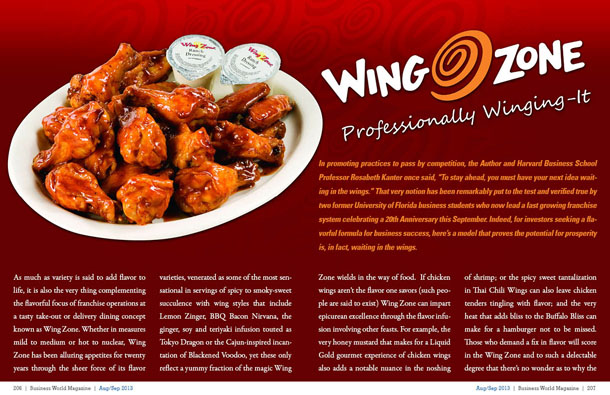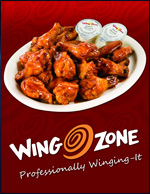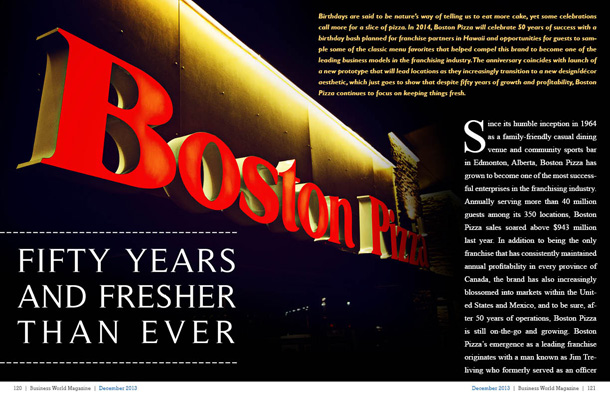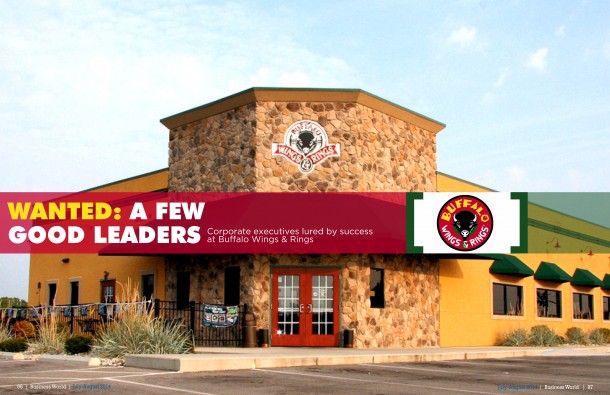
In promoting practices to pass by competition, the Author and Harvard Business School Professor Rosabeth Kanter once said, “To stay ahead, you must have your next idea waiting in the wings.†That very notion has been remarkably put to the test and verified true by two former University of Florida business students who now lead a fast growing franchise system celebrating a 20th Anniversary this September. Indeed, for investors seeking a flavorful formula for business success, here’s a model that proves the potential for prosperity is, in fact, waiting in the wings.
As much as variety is said to add flavor to life, it is also the very thing complementing the flavorful focus of franchise operations at a tasty take-out or delivery dining concept known as Wing Zone. Whether in measures mild to medium or hot to nuclear, Wing Zone has been alluring appetites for twenty years through the sheer force of its flavor varieties, venerated as some of the most sensational in servings of spicy to smoky-sweet succulence with wing styles that include Lemon Zinger, BBQ Bacon Nirvana, the ginger, soy and teriyaki infusion touted as Tokyo Dragon or the Cajun-inspired incantation of Blackened Voodoo, yet these only reflect a yummy fraction of the magic Wing Zone wields in the way of food. If chicken wings aren’t the flavor one savors (such people are said to exist) Wing Zone can impart epicurean excellence through the flavor infusion involving other feasts. For example, the very honey mustard that makes for a Liquid Gold gourmet experience of chicken wings also adds a notable nuance in the noshing of shrimp; or the spicy sweet tantalization in Thai Chili Wings can also leave chicken tenders tingling with flavor; and the very heat that adds bliss to the Buffalo Bliss can make for a hamburger not to be missed. Those who demand a fix in flavor will score in the Wing Zone and to such a delectable degree that there’s no wonder as to why the brand’s most loyal dining fans are known as flavoholics.
Wing Zone presently has some 73 locations throughout North America as well as another ten locations internationally, and is expanding at an extent sufficient to secure national recognition from Success Magazine, Entrepreneur Magazine and Inc. Magazine as one of the fastest growing franchise concepts in its industry. The recipe for success has been deliciously driven by the franchise’s focus on flavor, and one great testament to this tasty talent can be found among tributes in Buffalo, New York. As a home to one of the world’s largest festivals dedicated to chicken wings, Buffalo is also the site of the Chicken Wing Hall of Fame, and yes, for wing wizards Buffalo represents every bit of what Cooperstown does to baseball or Canton does to football. In conferring Hall of Fame status on Wing Zone Founders Matt Friedman and Adam Scott in 2009, the electing committee declared that the entrepreneurial journey in which these two men embarked in 1991 “forever changed the Buffalo chicken wing landscape.†While both Friedman and Scott have been heralded as kings in the making of wings, their road to ruling the roost began with little more than a peasant’s pittance. Anyone questioning how much money it takes to launch a successful international franchise might be shocked by Matt Friedman’s answer – “around five hundred dollars.â€
Â
Covert Culinary Ops
In 1991, both Friedman and Scott were enrolled in the business administration program at University of Florida in Gainesville. Friedman was focused on marketing while Scott was majoring in finance. Outside of classes, the two were also fraternity brothers in Pi Kappa Phi which is among the oldest of college fraternities in America. While pretzels and beer reportedly account for a significant share of the dietary sensitivities of college kids, Friedman was actually raised in upstate New York, and as such, soon disappointingly realized that Gainesville had little in the way of wing eateries; a fact that was made all the more evident on those days when the famed Florida Gators took to the field – after all, what good is gathering to Gator Chomp without cheerfully chomping down some wings too?
With their cooking proving particularly popular in taste tests conducted with fraternity brother, Friedman and Scott astutely sensed there was a good business opportunity if they acted to fill the void in wing-related venues. They scraped-up some $500 dollars which helped cover the cost of food and supplies purchased from Sam’s Club. They had a printed-menu on flyers which were distributed around campus and a phone line in what became their base of operations, in this case, the very kitchen of the Pi Kappa Phi fraternity house. Now, as one might expect, operating a business from a campus fraternity house could very well prompt particular legal problems. Friedman explains that they were very careful to not disclose their whereabouts whenever someone inquired in-person or over-the-phone when taking delivery orders. “We didn’t even put our address on any of the printed materials,†says Friedman. “We’d get calls from all over Gainesville and whenever someone asked where we were located, we’d just say, ‘Near campus,’ and that’s how we spent our first several months in business.â€
Working shifts congruent with student-relevant hours of 4:00 pm to 2:00 am, Friedman says they embraced a simple business model. “We were filling a void, which from a consumer’s perspective is always a great thing to do. We focused on one core item and having a variety of flavors… since we were students, we knew what students wanted.â€
Yet, these wings were ultimately demanded by an increasing audience of consumers and a day came when the fraternity kitchen would no longer suffice. Scott and Friedman went on to establish their first “legitimate†Wing Zone in Gainesville in 1993. Over the next few years, Wing Zone grew to seven other locations strategically based near Southeastern Conference colleges in Florida, Georgia and South Carolina. Over time, Wing Zone’s menu items and flavor profiles also expanded, but the business model remained much the same. While each location can accommodate a small composite of dine-in consumers, the operation largely flourished as a take-out or delivery concept with little in the way of overhead costs. “We’re not a sports bar, and our environment focused on take-out, drive-through or delivery components with a little catering too. We still thrive at nights or on weekends, especially during sporting events, and everything is still freshly cooked to order in eight to twelve minutes,†says Friedman.
After seven years of consistent growth and success, Friedman and Scott resolved to take the next step by starting a franchise. Since 2000, Wing Zones have not only become highly visible venues on college campuses throughout the southeast, but also among a number of military bases and community commercial centers. To centralize operations and enable quickly access areas of the southeast, corporate headquarters were established in Atlanta, Georgia.
“Starting a franchise was a big moment for us and probably the best decision we ever made, but it made sense because our business model was simple and successful; the costs were reasonable and we were profitable … we knew we had something unique that people really wanted,†says Friedman. The rest is, of course, history (or history in the making) which will all be recognized in a grand repast this October when franchise partners, store managers and franchisees alike flock to Atlanta for “Winging-It for 20 Years,†the anniversary celebration of Wing Zone.
Franchisee Focused
Wing Zone offers a flexible franchise model which allows for single or multi-unit purchase, though in many, investors take out a “two-pack†agreement, essentially opening one location followed 18 months later with another opening in the respective community. Potential franchisees can expect to invest from $200,000 to $250,000 to open a Wing Zone. Friedman breaks those costs down explaining some $100,000 typically covers construction or build-out costs for a space comprised by 1200 to 1500 square-feet operational space, another $100,000 for equipment & supplies, and the remainder used for signage, computers and other miscellaneous costs. Franchisees need not necessarily be owner/operators in the conventional sense, but Friedman says they should be prepared to work fulltime on the business. “It’s not like we want them behind a counter sixty hours a week, but we want them to be engaged and dedicated to the business … and that can be demanding; there’s long hours, work on evenings and weekends, and people need to understand that it requires work,†says Friedman.
Fortunately, franchisees benefit from the work of a dedicated in-house corporate team that provides all manner of assistance in site selection, build out, training, marketing and supply-chain needs. Once permits have been secured, location build-out normally takes some 45 days to complete, but during this time, franchisees have three weeks of training in Atlanta which accommodate all aspects of restaurant functions as well as back office requirements. Prior to the new Wing Zone opening, area representatives will also come to the location to provide assistance with staff development and training, and will be there on-hand to support operations for up to a week after the opening. A dedicated director of marketing helps design customized marketing plans and Wing Zone has established strategic partnerships with other firms specializing in direct mail and social media solutions. Benefits additionally abound in other strategic relationships Wing Zone has established to further support franchisees. Whether it is the quality poultry produced by Tyson or the consistency imparted in flavoring formulas from Canada’s Giraffe Foods; whether it is the building fixtures and materials supplied by Atlanta Fixture & Supply or the POS systems secured through Rochester-based Microworks, Wing Zone has eliminated all the guess work entrepreneurs typically encounter when starting and equipping a new business, so franchisees can more rapidly achieve success.
With new opening underway in the Middle East to complement ongoing growth in North America, Wing Zone continues to represent one of the great success stories in its industry. Friedman expresses optimism for the future, explaining that in recent years the company has found its greatest traction by working with existing entrepreneurs of the restaurant business seeking to expand their portfolio of brands. He says the company will continue to focus on developing relationships in this market segment. “The restaurant business is a very unique and interesting culture, and those who excel at it have it in their blood. We see ourselves as restaurant guys, and the restaurant business has been amazing for us,†says Friedman. To that point, he adds loving the total business is more important than simply loving what comes out of the kitchen. He says, “Just because you love to eat doesn’t mean you should own a restaurant.†Then again, if you love eating great wings and can discern the flavor of quality over that of the less-than – a score is in store in the Wing Zone.
For more information, please visit their website at: Â Wing Zone
Preferred Vendors of Choice:








